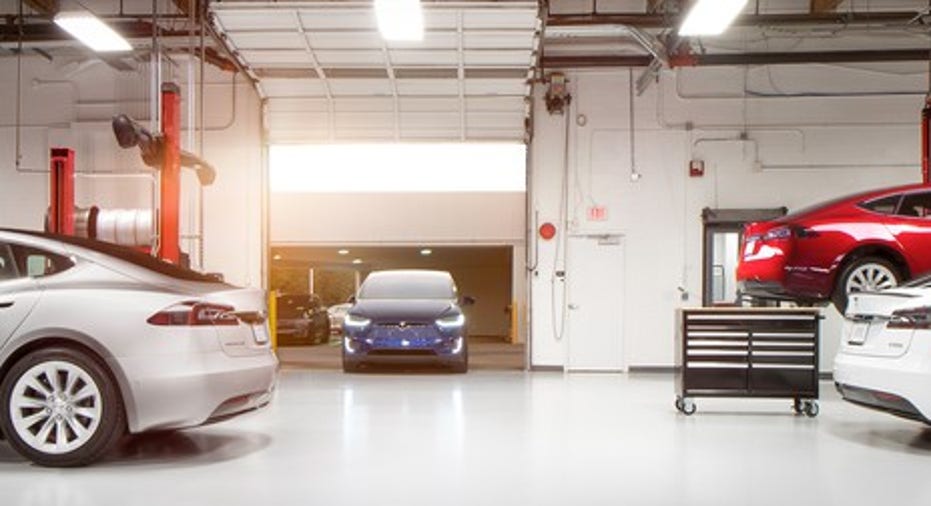Tesla Is Going to Get Into the Body Shop Business

Getting a Tesla (NASDAQ: TSLA) vehicle repaired at a third-party certified body shop can in some cases prove to be a nightmare. My story helped raise awareness of one of Tesla's long-standing weaknesses, one that is frequently discussed on forums and Tesla enthusiast communities. Tesla's head of sales and service Jon McNeill responded on Tesla Motors Club, acknowledging that the body shop experience needed to get better and outlining two ways the company was planning on improving repair times: adding hundreds of additional third-party body shops to the network, and in some cases, having Tesla representatives manage the repair by coordinating directly with the shops.
In the Q1 2017 shareholder letter released last night, the company directly addressed vehicle repairs in detail, something it doesn't typically do in earnings releases, saying repair times have fallen by 35% this year. The additional detail may have been in part a response to the news cycle that my story started. The most important thing is that Tesla addresses the underlying issues for the sake of the customer experience.
Tesla service center. Image source: Tesla.
Meanwhile, I had heard some rumors that Tesla was contemplating entering the body shop business directly, which can potentially be a massive undertaking depending on the extent of those ambitions. It turns out that's exactly what Tesla is going to do.
Starting this year
Here's the relevant snippet from the letter (emphasis added): "To significantly improve the customer experience with out-of-warranty body repairs, we intend to open the first Tesla-owned body repair shops later this year and expand the existing network of third-party Tesla certified body shops."
Like many Tesla announcements, this one raises more questions than it provides answers. How many first-party body shops is Tesla planning on opening this year? What's the longer-term strategy? Will Tesla create a large network of first-party body shops or only in regions that have the most strategic value? How much are we talking about in terms of capital expenditures? Will these body shops only work on Tesla vehicles or will they serve other brands? Assuming they only work on Teslas, is there risk of idle capacity? Will they use a similar model as Tesla service centers, which price close to cost and are not consider profit centers?
I reached out to Tesla with these questions, but Tesla did not immediately respond to a request for comment.
Tesla's primary reason seems to be improving repair times, not making money
In the U.S. alone, the collision repair market represents roughly $35 billion in annual sales, according to Automotive News. At the same time, the industry has seen a lot of consolidation, with four large chains operating approximately 1,500 body shops in North America. It's still a fragmented market, since that combined total represents just 4% of the 38,000 body shops in the region, but the consolidation trend is expected to continue. The body shop business is more stable than the market for selling new cars -- macroeconomic conditions have no bearing on when people get into accidents -- but Tesla's plan here is probably quite modest for the time being.
It seems as if Tesla's primary motivation is to address long repair times within its third-party body shop network in order to improve the customer experience; there doesn't appear to be a profit motive. Anything that improves repair times is a welcome announcement, and hopefully the effort doesn't distract from more important things like ramping Model 3 production or revamping the distribution model for the solar business.
10 stocks we like better than TeslaWhen investing geniuses David and Tom Gardner have a stock tip, it can pay to listen. After all, the newsletter they have run for over a decade, Motley Fool Stock Advisor, has tripled the market.*
David and Tom just revealed what they believe are the 10 best stocks for investors to buy right now... and Tesla wasn't one of them! That's right -- they think these 10 stocks are even better buys.
Click here to learn about these picks!
*Stock Advisor returns as of May 1, 2017
Evan Niu, CFA owns shares of Tesla. The Motley Fool owns shares of and recommends Tesla. The Motley Fool has a disclosure policy.



















